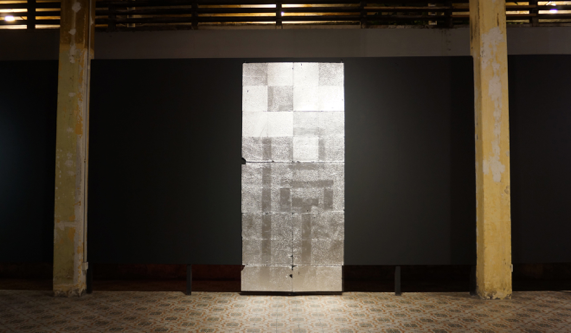Tan Kian Ming

The Exploration of Immigrants, work in progress, aluminum foil paper
Since the fifteenth century, a large population from China has emigrated to Southeast Asian countries. The heterogeneous Chinese communities have been isolated from the Chinese world since the Sino-Indonesian Dual Nationality Treaty of 1955. Johor, a region located in southern Malaysia and the confluence of trade routes within Maritime Southeast Asia, is a highly racially diverse area with 48% non-Malay population, among which 30% are of Chinese origins. Bangsa Johor is a term coined by the Johor state to unify the racially diverse population regardless of their ancestry. But can individuality be unified?
As a Chinese Malaysian, Tan Kian Ming utilises his bi-cultural fluency to question the power relationship in post-colonial Southeast Asia and seeks to re-represent the history through a personalised trajectory. For him, language serves as means of regional-specific discourse. Language is the basis of symbolic interactions, and the foundation of collective means. He redefines language, with its transformative capabilities, as the symbolic gesture of his personal endeavour with cultural identification.
Tan’s artwork is marked by a consistent critical examination of Malaysian’s historical past. Dealing with the complex legacies of multiple waves of colonization, it is nevertheless filled with a mediated touch of intimacy. The uncanny relationship between the fait accompli and unsettled rootlessness in the post-colonial discourse is what Tan tries to articulate in his works. Most emblematic is the on-going Exploration of Immigrating – an archival project researching the tombs of various ethnic groups, including his own ancestors – in which he explores the means of collective identity within the scope of the migration history in Malaysia through using foil embossing to inscribe the texts written on the tombstones, reassembling the debris of a dismembered tradition. The meticulous embossing interrogates both a collective history and a personal melancholic longing for identification. Foil’s weightlessness and convertible nature casts a strong, almost ironic contradiction with the content it carries: the entangled burden of colonial past.
The use of foil can be identified in many of Tan’s latest works. In Adjustment (2015), Tan embosses the signs painted over the road and shifts perceptions of public and private. ‘We are so used to see these signs. They are in fact particular to the local region and they are manipulating our sub-consciousness. But at the moment when I emboss it to a new medium and present it in another context, what can it bring to us? What new story does it tell?’. Challenging the literary possibilities of an existing language, Tan transmutes the hidden narrative of simplified signs to raise the questions: when the commonality is being seen through idiosyncratic lens, does it still stand on its own? How does the subject transcend its context and establishing new connotation?

Stop, from Adjustment series, 2015, aluminum foil paper, 270cm × 120cm
Tan referred to Chinese artist Xu Bing whose work also questions collective identity through means of language: ‘we both want to bring in something new to look at the old topics. He made up new characters and I am using a new material. [Xu Bing] uses traditional wood block printing techniques. But I did not want to use a medium that already carries the historical burden itself; I want to use a modern technique to introduce possibilities of new perspectives’. Removing political ideology from the picture, we are left with something all the more empathetic: the dissolving boundaries in globalised narrative as well as the estrangement between self-consciousness and collective identity.
Culture lies in tales, in the realm of collective memories. Yet for migrants, in what language their stories get to be told? For Tan, identity is relational and does not yield to the hegemony – it sparks in the liminal space of difference, between his mother tongue and Malaysia’s national language – as river never forget its source, the lost past shall be re-encountered.
Tan’s website: https://www.tankianming.com/
27.11.2018